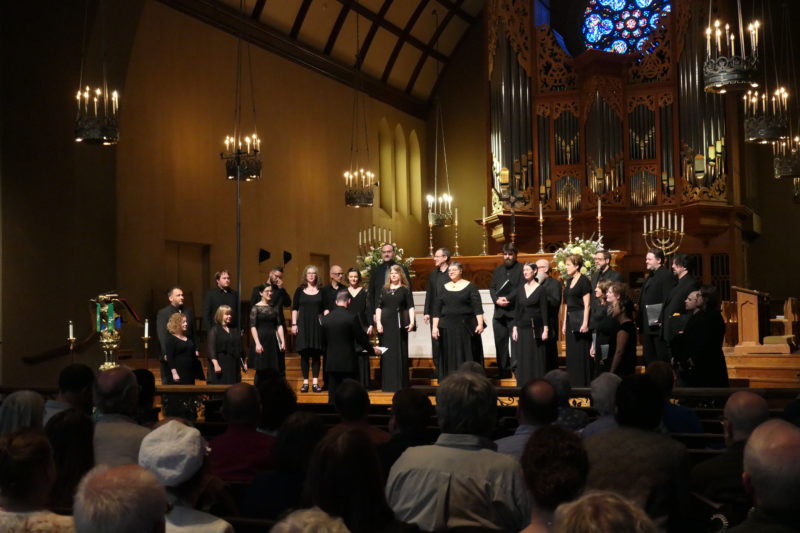“On second thought, maybe I should go to the concert. Even if it is church music played in a church. Or maybe because it is church music played in a church – time to stretch yourself.” Thus were my musings after a friend urged me to attend Capella Romana’s The Vigil this weekend. Am I glad I did. I cannot even remember the last time I had goosebumps like this while listening to live music. Which tells you a) I had never before heard Capella Romana, b) it was an unusually profound piece of music, sublimely performed all the way through (hard, because it is long and technically quite difficult) and c) I probably don’t go out to concerts often enough.
And so I sat on a Sunday afternoon in a church attempting to hold back tears and racking my brain trying to remember what I knew about Sergei Rachmaninov, about his choral work All-Night Vigil, op.37 just so the emotions wouldn’t overwhelm me.
( you can yourself listen to another glorious (Latvian) performance of the piece here: https://www.youtube.com/watch?v=VgBLkrfjjys)
Having now supplemented my meager recall with some reading, I am once again astonished about what some people pull off even if life is beyond difficult. Rachmaninov was born into a rich Russian family in the late 19th century, abandoned by his quickly bankrupted father at a young age and shipped off to live with a music teacher, who soon threw him out of the house. He had not just a way with music both as a composer and as a performer, he also had a way with words. Words that expressed with precision what he experienced as an artist. “I felt like a ghost wandering in a world grown alien. I cannot cast out the old way of writing and I cannot acquire the new.” He said this towards the end of his life, a romantic soul left behind by the modernist ascendence of the likes of Schoenberg, Stravinsky and Bartók, recognized for his amazing skill as a pianist, but derided or ignored for his compositions.
And in fact, his music surges, melodic to the point of forcing you to hum, it flows. And flows. And flows. In fact so much, that the perceptive folks of the choral ensemble created a program that added some sacral music by other Russian liturgical composers that preserved some of the structure of an orthodox All-Night Vigil service, hymns, prayers and psalms that let you breathe between the waves of exaltation.
Rachmaninov did not attend church and his refusal to go to confession made it even harder to marry the woman he courted: because she was his first cousin they needed dispensation from the Tsar, and could only be married by a priest assigned to the military since he reported to the generals instead of the church, who would have prohibited a marriage by someone without confession. After the revolution of 1905 the couple went into self-imposed exile to Dresden, Germany, where he felt disoriented and had difficulty composing. They returned to Russia; later he traveled all over the country to visit soldiers wounded in the first year of WW 1 and in 1915 composed, in response to the tragedy he witnessed and in less than 2 weeks, the Vigil, a choral masterpiece.
He set music to 15 texts taken from Vespers, Matin and Prime; nine of the movements were based on the traditional Russian -Orthodox chant, the rest his own interpretation of this sacral expression. Here is his way with words again: He called these chant-like movements conscious counterfeits. I think I will shamelessly adopt that term for my photomontages, such a perfect expression of appropriation+creation. The piece was quite successfully performed in Russia, only to be prohibited in times of Bolshevik anti- religious fervor after the second Russian Revolution. In 1917 he therefor once again went into exile, this time in the US where he died at age 69 in 1942, after a severely dwindling output as a composer. He is buried in Valhalla, NY, since his wish to be interred in Russia was not fulfilled. Contemporary music criticism of course recognizes the musical genius, better late than never, I guess.
Tidbits, just for the fun of it: Capella Romana was joined by a basso profundo, Glenn Miller, (below center) whose voice and ability to project was a marvel. (Here he is singing something else that shows youth range: https://www.youtube.com/watch?v=DGLm3eZ3nKY)
Soloist Joseph Muir (on the left) sang lyrically without giving in to the tenor’s temptation to emote – it was a masterfully restrained performance fitting the sacral setting.
And Benedict Sheehan, the conductor, managed to keep all the interlocking parts beautifully transparent, and balanced for the most part. (He also managed to look like the age of my sons, but he himself has 7 daughters. Sometimes you wonder.)
Bonus, for the cinephiles out there: Rach goes to the movies! (A compendium of the many movies that had Rachmaninov’s figure or his music play a role….in addition to echoes in 21st century music – I add to that that Pussy Riot also references his music, while busy avoiding being poisoned, I guess…. see second link below.
http://www.interlude.hk/front/rach-goes-movies/
https://pen-international.org/news/russia-pussy-riot-punk-moleben-put-putin-away
Photographs sneaked from my seat in the pews, located in the back given my budget…. since I am now a fan, I’l assume they’ll forgive me for taking those without official permission.










